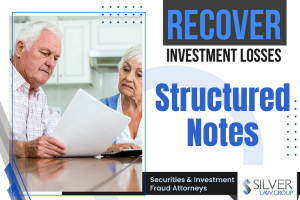A former UBS broker recently won a FINRA arbitration claim against UBS Financial Services for misleading him and his clients about the risks associated with structured notes tied to Lehman Brothers Holdings, which suffered significant losses in 2008. Silver Law Group primarily represents investors in claims against UBS and other brokerage firms. However, this award deserves attention because it highlights a fundamental flaw in Wall Street’s business model. UBS created a system to use its sales force to sell millions of dollars in Lehman Brothers debt. However, faced with undesirable evidence of Lehman’s financial problems, UBS knowingly chose to not inform its financial advisors or retail clients about the problems. Put differently, this was a “top down” problem because the misconduct was by UBS senior management. We are seeing the same set of facts in claims by investors against UBS in Puerto Rico, where UBS senior management served as the biggest supporters of proprietary UBS bond funds and UBS placed no restrictions on financial advisors or on the concentration levels in a customer’s portfolio.
The FINRA arbitration panel awarded $4 Million in compensatory damages, $1 Million in punitive damages and $335,000 in attorneys’ fees and costs, specifically finding UBS had “deliberately prevented the distribution of material information about Lehman Brothers sinking financial condition and continued to recommend the sale of Lehman Brothers [Notes] despite clear evidence of the company’s rapid decline.” The panel also ordered that the 39 complaints filed against this broker be erased from his record.
The backdrop leading to this award is eerily similar to what is happening today at UBS in Puerto Rico (“UBS-PR”). UBS-PR aggressively pushed the sale of closed-end bond funds (CEFs) involving Puerto Rican debt which were proprietary to UBS. UBS allegedly misled the majority of its brokers and clients concerning the risks associated with CEFs. UBS is also alleged to have withheld negative information about the CEFs from its brokers and its clients, thereby preventing a full understanding of Puerto Rico’s deteriorating economy and the effects that decline would have on the leveraged and illiquid CEFs. Could it be that the majority of UBS-PR brokers who now find themselves facing numerous customer complaints were simply following the instructions given by UBS and doing what they were trained to do—sell UBS recommended products?
 Silver Law Group is actively investigating potential claims involving Stifel, Nicolaus broker Chuck Roberts (CRD# 2064602), a financial advisor currently employed with Stifel, Nicolaus & Company, Inc. with offices located in New York, NY and Miami Beach, FL. Roberts is currently the subject of sixteen customer-initiated arbitrations filed with the Financial Industry Regulatory Authority (FINRA) alleging misconduct related to investments in structured note products. Continue reading ›
Silver Law Group is actively investigating potential claims involving Stifel, Nicolaus broker Chuck Roberts (CRD# 2064602), a financial advisor currently employed with Stifel, Nicolaus & Company, Inc. with offices located in New York, NY and Miami Beach, FL. Roberts is currently the subject of sixteen customer-initiated arbitrations filed with the Financial Industry Regulatory Authority (FINRA) alleging misconduct related to investments in structured note products. Continue reading › Securities Arbitration Lawyers Blog
Securities Arbitration Lawyers Blog


 Stockbroker and financial advisor
Stockbroker and financial advisor  Structured notes are a lesser-known investment vehicle for individual retail investors. These are
Structured notes are a lesser-known investment vehicle for individual retail investors. These are